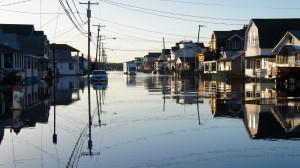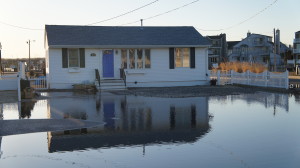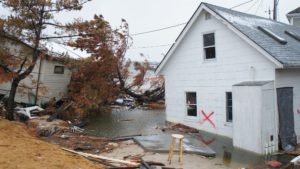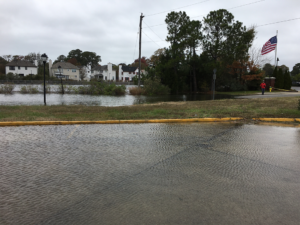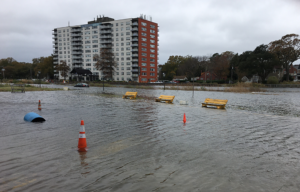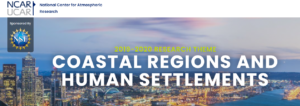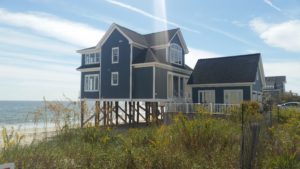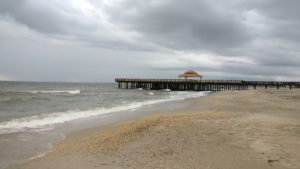Interests
-
- Coastal adaptation and resilience
- Displacement and relocation
- Climate and environmental security
My research focuses on coastal adaptation, resilience, and vulnerability. More specifically, I am interested in whether relocation can serve as an effective adaptation strategy and viable solution to sea level rise in coastal communities and what opportunities could emerge from this process. My research interests also include:
• Adaptation of coastal land use and urban development to flooding
• Climate change impacts on coastal migration dynamic and displacement
• Development of policy and planning mechanisms to improve relocation planning
• Utilization of computer models, decision support tools, and mapping to inform the relocation process
• Identification of adaptation policies and programs to foster coastal resilience and stability.
A successful adaptation to more frequent and severe coastal flooding can only be achieved by combining knowledge and experiences from many disciplines and stakeholder groups. Accordingly, my research efforts emphasize the co-production of knowledge, transformative learning, and local and regional capacity building.
Publications
- Crawford, M.*, Bukvic, A., Rijal, S. Gohlke J. (2023). The social cascades of exposure to flood induced Natech events on vulnerable populations in Hampton Roads, Virginia. Natural Hazards (accepted).
- Bukvic, A. & Borate, A.* (2023). Identifying vulnerabilities of older residents in Miami-Dade County to episodic and chronic flooding. Disaster Medicine and Public Health Preparedness, 17(e465), 1–8. https://doi.org/10.1017/dmp.2023.133
- Bukvic, A., Mitchell, A.*, Shao, Y. & Irish, J.L. (2023). Spatiotemporal implications of flooding on relocation risk in rural and urban coastal municipalities. Land Use Policy, 132, 106754. https://doi.org/10.1016/j.landusepol.2023.106754
- Valle-Ramos, A., Alland, A., & Bukvic, A. (2023). Using machine learning to understand relocation drivers of coastal populations in response to flooding. AMS Artificial Intelligence for the Earth Systems, 2(2), 220054. https://doi.org/10.1175/AIES-D-22-0054.1
- Bukvic, A. & Barnett, S.* (2023). What drives urban coastal residents to consider relocation? Insights from the U.S. East Coast. Journal of Environmental Management 325, 116429. https://doi.org/10.1016/j.jenvman.2022.116429
- Mitchell, A.*, Bukvic, A., Shao, Y., McLaughlin, D., & Irish, J. (2023). Assessing the impacts of coastal flooding on a watershed scale in Hampton Roads, Virginia. Environmental Management, 71(4), 741-754. https://doi.org/10.1007/s00267-022-01759-9
- Garland, A. Bukvic, A. & Maton, A.* (2022). Perceptions of hazards, environmental change, and relocation in the North Slope Borough, Alaska. Climate Risk Management, https://doi.org/10.1016/j.crm.2022.100460
- Bukvic, A., Mandi, K., Finn, D., Mayo, T., Wong-Parodi, G., Merdjanoff, A., Davis, C., Haacker, R., Morss, R., O’Lenick, C., Wilhelmi, O., Lombardozzi, D., & Alland, J. (2022). Advancing interdisciplinary and convergent science for communities: Lessons learned through the NCAR Early-Career Faculty Innovator Program. Bulletin of the American Meteorological Society, 103(11), E2513-E2532. DOI: https://doi.org/10.1175/BAMS-D-21-0265.1
- Bukvic, A., Whittemore, A.*, Gonzales, J.*, & Wilhelmi, O. (2022). Understanding relocation in flood-prone coastal communities through the lens of place attachment. Journal of Applied Geography, 146, 102758.
- Finn, D., Mandi, K., Bukvic, A., Davis, C., Haacker, R., Morss, R., O’Lenick, C., Wilhelmi, O., Merdjanoff, A., Wong-Parodi, G., & T. Mayo (2022). Moving from interdisciplinary to convergent research across geoscience and social sciences: Challenges and strategies. Environmental Research Letters, 17(6), 061002. DOI: 10.1088/1748-9326/ac7409
- Allen, T., Behr, J., Bukvic, A., Calder, R.S.D., Caruson, K., Connor, C., D’Elia, C., Dismukes, D., Ersing, R., Franklin, R., Goldstein, J., Goodall, J., Hemmerling, S., Irish, J., Lazarus, S., Loftis, D., Luther, M., McCallister, L., McGlathery, K., Mitchell, M., Moore, W., Nichols, C.R., Nunez, K., Reidenbach, M., Shortridge, J., Weisberg, R., Weiss, R., Wright, L.D., Xia, M., Xu, K., Young, D., Zarillo, G., Zinnert, J.C. (2021) Anticipating and adapting to the future impacts of climate change on the health, security and welfare of Low Elevation Coastal Zone (LECZ) communities in Southeastern USA. Journal of Marine Science and Engineering, 9(11),1196. DOI: 10.3390/jmse9111196
- Bukvic, A., Borate, A.*, Hughes, S. Imburgia, S. Stiles, S., & Weaver R. (2021). Why context and scale matter: Exploring neighborhood level resilience in the City of Hampton, Virginia. Journal of Flood Risk Management 14(2), DOI: 10.1111/jfr3.12698
- Bukvic, A. & Borate, A.* (2021). Acquisition and relocation in coastal communities: assessment of FEMA Hazard Mitigation Grant Program 1989-2016. Environmental Hazards, 20(3), 279-299. DOI: 10.1080/17477891.2020.1804819
- Prince, B.C.*, Juran, L., Venkataramana, S., Bukvic, A., & MacDonald, M.C. (2020). A statistical and spatial analysis of water poverty using a modified Water Poverty Index. International Journal of Water Resources Development, 37(2), 339-356. DOI: 10.1080/07900627.2020.1768829
- Bukvic, A., Rohat, G.*, Apotsos, A., & de Sherbinin, A. (2020). Coastal vulnerability mapping: what is meta-analysis telling us about this practice? Sustainability, Special Issue: Climate Risk and Vulnerability Mapping, 12(7), DOI: 10.3390/su12072822
- Bukvic, A., Biber, P., Barreto, M., & Roberts, S. (2019). Mobility: A Research Strategy for a New Coastline. Coastal Management, 47(6), 611-620. DOI:10.1080/08920753.2019.1669103
- Bukvic, A. (2019). Facilitating stakeholders’ engagement in climate change relocation planning: The Coastal Relocation Leaf. Social Sciences, 8(6): 197. DOI:10.3390/socsci8060197
- de Sherbinin, A., Bukvic, A., Rohat, G.*, Gall, M., McCusker, B., Preston, B., Apotsos, A., Fish, C., Kienberger, S., Muhonda, P., Wilhelmi, O., Macharia, D., Shubert, W., Sliuzas, R., Tomaszewski, B., & Zhang, S. (2019). Climate Change Vulnerability Mapping: A Systematic Review and Future Prospects. WIRES Climate Change, 10(5), e600. DOI:10.1002/wcc.600
- Bukvic, A. & Harrald, J. (2019). Rural versus urban perspective on coastal flooding: the insights from the U.S. Mid-Atlantic communities. Climate Risk Management, 23, 7-18. DOI: 10.1016/j.crm.2018.10.004
- Bukvic, A., Gohlke J., Borate, A.*, & Suggs, J.* (2018). The health and wellbeing risk to older residents residing in flood-prone coastal communities. International Journal of Environmental Research and Public Health, Special Issue: Extreme Weather Events and Health, 15(12), 2900. DOI: 10.3390/ijerph15122900
- Bukvic, A., Zhu, H. Lavoie, R.*, & Becker, A. (2018). The role of proximity to waterfront in the relocation decision-making post-Hurricane Sandy. Ocean and Coastal Management, 154, 8-18. DOI: 10.1016/j.ocecoaman.2018.01.002
- Bukvic, A. (2017). Towards the sustainable climate change population movement: The Relocation Suitability Index. Climate and Development, 10(4), 307-320. DOI: 10.1080/17565529.2017.1291407
- Bukvic, A. & Owen, G.* (2017). Attitudes towards relocation following Hurricane Sandy: should we stay or should we go? Disasters, 41(1), 101-123. DOI: 10.1111/disa.12186
- Bukvic, A. (2015). Identifying Gaps and Inconsistencies in the Use of Relocation Rhetoric: A Prerequisite for Sound Relocation Policy and Planning. Mitigation and Adaptation Strategies for Global Change, 20(7), pp. 1203-1209, DOI: 10.1007/s11027-013-9532-5
- Bukvic, A., Smith, A.*, Zhang, A.* (2015). Evaluating Drivers of Coastal Relocation in Hurricane Sandy Affected Communities. International Journal of Disaster Risk Reduction, 13, 215-228, DOI: 10.1016/j.ijdrr.2015.06.008
- Bukvic, A. (2015). Integrated Framework for the Relocation Potential Assessment of Coastal Communities (RPACC): Application to Hurricane-Sandy Affected Areas. Environment, Systems, and Decisions, 35(2), 264-278, DOI 10.1007/s10669-015-9546-5
*Graduate students
Grants
NSF Dynamics of Integrated Socio-Environmental Systems (DISES), proposal #2307331; Team: Bukvic, A. (PI), Allen, T. (Old Dominion University) & Biber, P. (University of Southern Mississippi); Title: Coupled Socio-Ecological Mobility in the Coastal Zone, $592,027, 2023-2026
Conditions in coastal environments are changing due to more frequent and severe flooding. The future sustainability of coastal zones will depend on the ability of both the human and natural systems to co-migrate inland as sea level rise (SLR) increases. However, the amount of suitable space available for the migration of natural habitats is decreasing due to development pressures, resulting in coastal squeeze. This project investigates the potential for co-migration of socioecological systems affected by coastal squeeze in the U.S. Mid-Atlantic coastal region in response to SLR and different decision-making pathways. First, it measures the extent and types of coastal squeeze using geospatial analysis. Next, it identifies considerations affecting human mobility in flood-prone coastal communities and policy barriers to supporting coordinated socioecological mobility. Lastly, the project integrates produced outputs via statistical ordination and development of the Co-mobility Indices Matrix and Report cards to provide stakeholders with a structured way to assess the current and future coastal squeeze and potential mobility patterns in their localities. This research will advance science on coastal socioecological migration and provide policy-relevant empirical evidence on the mobility patterns of these two systems, informing coastal management and land use decisions.
Coastal squeeze is already present in many coastal settings and will only worsen with accelerated SLR and more frequent storm-surge flooding. At the same time, knowledge about the implications of a potential mismatch between migration rates of natural versus human habitats is currently lacking for most coastal systems. This project will evaluate scenarios of socioecological migration and different household and policy decisions in the Mid-Atlantic region. The project goals are to: 1) determine the current and future extent and configurations of coastal squeeze affecting marsh and human systems in the coastal zone based on projected SLR up to 2050 using geospatial modeling; 2) characterize the potential for SLR-driven human migration based on household- and place-based characteristics, preferences, and available support mechanisms using primary data collection (multi-modal surveys and workshops); and 3) identify mobility drivers in natural and human systems for the management and future scenarios of coastal squeeze using statistical ordination and development of the Co-mobility Indices Matrix (Co-MIM) and summary scorecards. Results will advance basic understanding of co-migration of coupled natural and human systems affected by coastal squeeze and internal and external forces modifying interactions between them in response to different policy decisions.
2019 National Center for Atmospheric Research’s Early Career Innovators Fellowship; Proposal title: Changing coastlines, changing mobility: when staying in place is no longer an option; Theme: Coastal Regions and Human Settlements, National Center for Atmospheric Research, Boulder, Colorado, May 2019 – 2021
NSF Humans, Disasters, and the Built Environment (HDBE), proposal #1920478; Team: Bukvic, A. (PI), Irish, J., Shortridge, J. & Zobel C. (all Virginia Tech); Title: Assessing the impacts of coastal flood-induced relocation on local jurisdictions, 2019-2021
This interdisciplinary project studies the impacts of relocation in coastal communities on local jurisdictions. It will provide data about possible consequences of flood-driven depopulation of coastal jurisdictions, including the loss of sociocultural identity and economic viability. This information is imperative to support localities in policy changes that would minimize the adverse effects of flood-induced relocation on their governance and institutional performance. This project serves national interests by advancing science on emerging problems in coastal communities whose resilience is vital for national security, stability, and welfare. Its societal benefits are also achieved by including highly vulnerable coastal communities (e.g. rural fishing villages and urban poor), which are already experiencing various socioeconomic and environmental challenges that may compound their vulnerability. Results and supplemental materials will be disseminated via an online web portal designed to facilitate a community of researchers, practitioners, and other stakeholders interested in coastal resilience. Outreach will be enhanced by the Virginia Cooperative Extension, which has a long history of education in rural communities.
The goal of this interdisciplinary project is to improve the scientific understanding of possible consequences of coastal flood-induced relocation on local jurisdictions with diverse socio-economic, cultural, institutional, and historic contexts. It will establish scenarios of coastal flood-driven relocation over different time scales in both rural and urban settings to discern potential implications of this process on the socioeconomic viability of local jurisdictions. This mixed-methods approach will rely on both quantitative and qualitative data to capture the contextual influences and complexities that typically shape local decision-making. The project activities will: 1) examine the risk of coastal flooding and develop spatiotemporal flood exposure scenarios of potential loss of businesses, real-estate, and corresponding population; 2) determine preferences for relocation destination among residents living in flood-prone areas obtained via household surveys, and 3) discern emergent macro-scale trends in relocation behavior using Agent Based Modeling (ABM). The analysis will be applied to two contrasting case study locations with different levels of urbanization on the Eastern Shore, Maryland, and in Hampton Roads, Virginia. Important aspects of the research strategy include interdisciplinary integration of geography, coastal and system engineering, and business analytics, as well as holistic analysis of circumstances that may affect the extent and progression of relocation from coastal flood-affected periphery. This project will ultimately lead to improved understanding of how physical, behavioral, and institutional factors interact to shape the evolution of coastal communities under increasing flood risks, thereby leading to more resilient communities in the coastal zone.
NSF CRISP Type 1/Collaborative Research, proposal #1638283; Team: Rhode-Barbarigos L. (PI), Zuo, W., Chao, S. (University of Miami) & Saad, W., Bukvic, A. (Virginia Tech); Title: Human-Centered Computational Framework for Urban and Community Design of Resilient Coastal Cities, 2017-2019
Coastal cities play a critical role in the global economy yet they are increasingly being exposed to natural hazards and disasters, such as hurricanes, recurrent flooding, and sea-level rise. These events can directly impact critical coastal infrastructure such as the energy, transportation, water, and sewer systems as well as the built environment, thus adversely affecting the safety and well-being of urban residents. The goal of this research is to create novel paradigms for resilient urban and community design uniquely tailored toward coastal cities. As such, it will enhance the damage-tolerance of the critical coastal infrastructure and foster a socio-economic resilience via anticipatory interventions. The developed techniques and simulation models will contribute to redefining traditional urban design strategies with the integration of architecture, urban design, land-use planning, civil engineering, and advanced computational methods centered on socio-economic drivers. This project will be conducted in close collaboration with the Cities of Miami and Miami Beach, which will serve as case study locations for the proposed research. Therefore, the proposed framework will have a direct and tangible societal impact on the high-risk coastal urban centers and provide them with the context-specific recommendations on optimal adaptation options. Broad dissemination efforts will be undertaken via a series of seminars targeted towards decision-makers and practitioners within the Cities of Miami and Miami Beach. An exposition at the Miami Museum of Science will also be organized to raise awareness and promote research on resiliency. The project will involve students via direct engagement in the research as well as via new learning modules that will integrate research finding in the existing curriculum. The proposed educational plan will thus help train a new workforce that is skilled in STEM disciplines, in general, and adept in resiliency planning of coastal cities, in particular.
This transformative research will introduce a novel methodological approach that symbiotically integrates urban design and socio-economic considerations into an advanced simulation and optimization framework to enhance the resilience of a coastal city’s critical infrastructure. This human-centered computational framework will help identify key resilient infrastructures, design forms, and land use patterns that will increase the damage tolerance of coastal cities while reducing the socio-economic impacts of coastal hazards and disasters. The proposed approach will bring together an interdisciplinary set of skills from engineering, architecture, and social sciences, to yield several key innovations: 1) a holistic human-centered computational framework for the design of resilient cities; 2) identification of key typologies, morphologies and their interdependencies by analyzing the urban design and its infrastructure networks; 3) an innovative flexible modeling and computational framework that integrate socio-economic characteristics for simulation and resilience optimization (damage tolerance) of the critical infrastructure; 4) a novel optimization framework that will facilitate making damage tolerance decisions that can achieve anticipatory resilience in face of disaster uncertainty; and 5) new identified interdependences, trends, and typologies of socio-economic system of highly-urbanized coastal communities based on the Cities of Miami and Miami Beach in Florida. In summary, the proposed research will lay the scientific foundation for envisioning and redesigning resilient coastal cities making them ready to meet anticipated future challenges.

